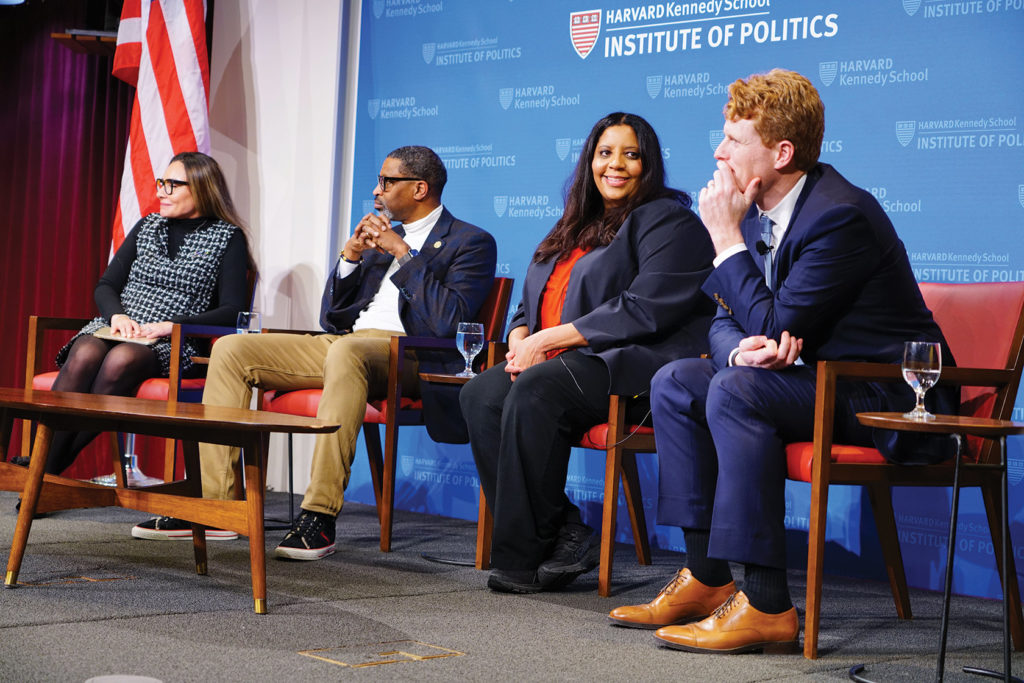Organizers get training at Kennedy School
Activists from across the country come together for 20-week program

A group of 16 organizers from around the country came to Boston last week to begin a 20-week training session to advance political, civil, and human rights in their communities.
The Organizing Accelerator, a collaboration between the National NAACP and Groundwork Project, a Massachusetts-based political advocacy group, brought the activists to the John F. Kennedy School of Government at Harvard University to learn tactics and techniques to effect progressive change.
Training for the Organizing Accelerator fellows follows a hybrid curriculum of virtual and in-person weekend-long sessions. The fellows, mostly from the South and Appalachia, work in a broad array of domains, including voting rights, prison reform, racial justice, elections, civic education and women’s rights.
To kick off the first in-person session, NAACP President Derrick Johnson joined with Groundwork Project founder and former Congressman Joe Kennedy III and Organizing Accelerator senior advisor Tracey Lewis at Harvard’s JFK Jr. Forum to discuss the initiative.
Kennedy, who launched the Groundwork Project to invest organizing resources in marginalized communities, said the training model was inspired by the Kennedy School’s orientation program for newly elected members of Congress.
“What if we did something like that for some of the most talented organizers in the country?” said Kennedy, who serves as managing director of nonprofit Citizens Energy in Boston and was recently appointed special envoy to Northern Ireland by President Biden. “What if we enabled them to share their experiences with us and each other? If they had access to a network and shared their skills with other organizers around the country?”
The NAACP president said he hoped the Organizing Accelerator would follow the successful model of the civil rights movement in shaping national goals to local needs.
“When you think about the civil rights movement … you can see that the reason they were so successful was because they were able to address systemic problems that were national in scope from a very local perspective,” said Johnson. “Their success was rooted in the connective tissues of local lived experience, as college students came home … and began to talk about shared strategies.”
Lewis, a veteran senior organizer who worked in five presidential campaigns across 17 states, was brought on to help create the curriculum.
“When I started doing this work volunteering on political campaigns, there weren’t many people in leadership who looked like me or shared my experiences,” Lewis said. “Now, with the Organizing Accelerator, we have the ability to empower others and be a resource for emerging organizers from underrepresented communities, and we try to be intentional about that. That’s why the Organizing Accelerator is special — it recognizes that need and offers a thoughtful solution.”
At the sessions, organizing fellows learn leadership development, mentorship and networking, along with fundraising, media skills, data collection and personnel management. Fellows also engage with national trainers and special guests from across the country.
During the first in-person session, fellows participated in training sessions at Harvard, connected with Massachusetts-based organizers at a local nonprofit bookstore, toured the JFK Presidential Library and Museum, and visited the new Embrace memorial to the Rev. Martin Luther King Jr. and Coretta Scott King on the Boston Common.
Caressa Bossa, who advocates for reducing juvenile sentences and providing mental health services for youth offenders, said the Accelerator sessions would help make her a more effective change agent.
“I’m here because I want to sharpen my skills and bring them back with me,” said Bossa, an associate with the Oklahoma Appleseed Center for Law and Justice.
Massachusetts Voter Table field organizer Layanie Oscar, who focuses on voter registration expansion in the Bay State, said, “This program is an opportunity to educate myself on the resources I can provide to my community.”






